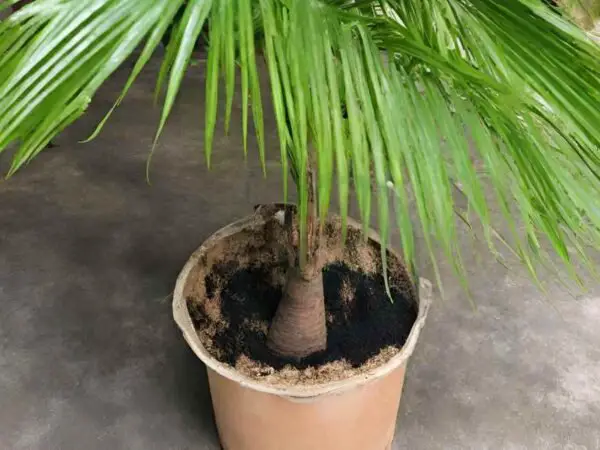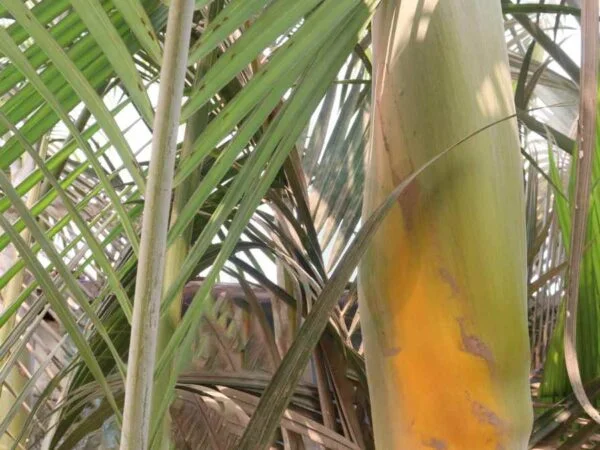Taking care of majestic palms can seem daunting, but with the right knowledge and a few straightforward tips, you can ensure these stunning plants thrive in your home or garden. Whether you are a seasoned gardener or a beginner, understanding the essential care requirements of majestic palms, including light, watering, and soil preferences, will help you maintain their lush, tropical beauty. Let’s dive into the specifics to make sure your majestic palms stay healthy and vibrant all year round.
Majestic palms (Ravenea rivularis) require bright, indirect light, though they can tolerate partial shade. Water them when the top inch of soil feels dry, keeping the soil consistently moist but not waterlogged. They thrive in well-draining soil with a slightly acidic to neutral pH (6.0-7.0). Maintain indoor temperatures between 65°F to 85°F (18°C to 29°C) and avoid cold drafts. Regularly mist the leaves or use a humidifier to keep humidity levels high, as majestic palms prefer a humid environment. Fertilize monthly during the growing season with a balanced, water-soluble fertilizer to support healthy growth.
Now that you have a foundation for caring for majestic palms, you’re well on your way to maintaining their elegance. For more detailed tips, troubleshooting common issues, or advanced care techniques, explore our full guide and become a majestic palm expert.
Key Takeaways
- Light Essentials
- Place your majestic palms in bright, indirect light to thrive.
- Watering Wisdom
- Water your palms thoroughly, allowing the soil to dry slightly between waterings.
- Ideal Environment
- Create a humid environment for your majestic palms to flourish.
- Repotting Rules
- Repot your palms every 2-3 years to refresh the soil and provide room for growth.
- Pruning Practices
- Trim brown or yellow fronds to maintain the health and appearance of your palms.
- Pest Patrol
- Keep an eye out for spider mites and scale insects; act promptly if detected.
Light Essentials
Recognize Signs
Learning to identify yellow leaves is crucial as it indicates overwatering, a common issue for Majesty Palms. Drying fronds turning brown are a clear sign of underwatering, requiring immediate attention. Keep an eye out for pests like spider mites, which can harm your plants.
Adjust Lighting
Place your Majesty Palms within 3 to 4 feet of a large east- or west-facing window to ensure they receive adequate light. Gradually acclimate your plants to direct sunlight indoors to prevent shock. Make sure your Majesty Palms get 6 to 8 hours of bright light daily.
Watering Wisdom
Watering Frequency
Maintain consistently moist soil to keep Majesty Palms healthy. Never let the soil dry out completely, adjusting watering based on signs of over or underwatering.
Avoid Extremes
Avoid exposing Majesty Palms to extreme temperature changes. Protect plants from cold, dry air to maintain health and balance humidity levels.
Soil Drainage
Ensure proper soil drainage to prevent waterlogging and use well-draining soil for optimal growth. Avoid water accumulation to prevent root rot.
Ideal Environment
Humidity and Temperature
Maintain high humidity levels for your Majesty Palms to thrive indoors. Protect them from cold, dry air that can cause harm. Enhance indoor humidity by using a humidifier or humidity tray.
When it comes to temperature, ensure your Majesty Palms are not exposed to extreme cold or heat. They prefer temperatures between 65-80°F. Sudden temperature changes can stress the plants.
Select Soil Types
Choose well-draining soil for your Majesty Palms to prevent root rot. Opt for soil that can retain moisture without becoming waterlogged. Consider adding perlite or sand to potting soil for improved drainage.
To create the ideal soil mix, combine regular potting soil with perlite or sand in a 1:1 ratio. This blend allows excess water to drain quickly while retaining enough moisture for the plant.
Repotting Rules
When to Repot
Repot Majesty Palms every other year or if roots emerge at the soil's surface. Increase pot size by 2 inches during repotting. Ensure adequate drainage in the new pot.
etimes, it's challenging to determine when to repot your Majesty Palm. Here are some signs that indicate it's time for a change:
- Roots visibly growing at the top of the soil
- Soil drying out quickly after watering
- Slow growth or yellowing leaves despite proper care
Remember, repotting provides your Majesty Palm with fresh nutrients and space to grow healthy roots.
Pruning Practices
How to Prune
Prune yellow or brown fronds to enhance the appearance of your Majesty Palms. Allow new growth by trimming off damaged fronds. Regular pruning is essential for maintaining the health and aesthetics of your Majesty Palms.
Pruning not only improves the visual appeal of your plants but also promotes their overall well-being. By removing dead or discolored fronds, you enable the plant to focus its energy on healthy growth. This simple practice can prevent diseases and ensure that your Majesty Palms thrive in optimal conditions.
- Trim yellow or brown fronds
- Promote new growth
- Maintain health and aesthetics
Pest Patrol
Pests can harm Majesty Palms, such as spider mites. Identify these pests early to prevent damage. Maintain good humidity levels to deter infestations.
Wipe the undersides of leaves with a moist rag regularly. This simple step helps prevent spider mite infestations effectively.
Identify Pests
Spider mites are common pests that attack Majesty Palms. These tiny creatures can cause significant damage to your plants if left unchecked.
Maintain a watchful eye for any signs of webbing or stippling on the leaves, indicating a possible spider mite infestation.
Regularly inspect the top and bottom of the leaves for any visible pests or eggs. Early detection is key to preventing a full-blown infestation.
Placement Tips
Find the Right Spot
When caring for Majesty Palms, it's crucial to select suitable locations within your home. Opt for bright corners in bathrooms or bedrooms, where indirect sunlight is abundant. These plants also thrive in offices, living rooms, or dining areas. Avoid placing them near direct drafts or areas with extreme temperatures to prevent stress on the plants.
- Pros:
- Majesty Palms can add a touch of elegance and tropical vibes to any room.
- They are relatively low-maintenance and can adapt well to indoor environments.
- Cons:
- These plants are sensitive to overwatering, so it's essential to monitor their watering needs carefully.
- Majesty Palms may attract pests like spider mites if not properly cared for.
Consider using a tray filled with pebbles and water to increase humidity levels around your Majesty Palms. This method helps mimic their natural habitat and keeps them healthy. Periodically misting the leaves can provide extra moisture, especially during dry seasons or in air-conditioned rooms.
- Choose a suitable location: Ensure your Majesty Palms receive adequate indirect sunlight without being exposed to harsh, direct light.
- Monitor temperature: Maintain a consistent temperature range between 60-80°F (15-27°C) to keep your plants happy and healthy.
- Humidity control: Use a pebble tray or a humidifier to create the ideal humidity level of around 40-50% for your Majesty Palms.
- Avoid cold drafts: Protect your plants from cold drafts by placing them away from windows or doors that may let in chilly air.
Remember that proper placement is key to the well-being of your Majesty Palms. By following these tips, you can create an optimal environment for these majestic plants to thrive and beautify your living spaces.
Common Questions
FAQs
Majesty Palms are popular houseplants, but they come with their set of questions and problems. Many plant owners worry about how much sun these plants need.
e common questions revolve around watering frequency, soil type, and ideal temperatures for Majesty Palms. Plant enthusiasts often wonder about the best practices for preventing yellow leaves or browning tips.
Here are a few FAQs to address your concerns:
- How often should I water my Majesty Palm?
- What type of soil is best for Majesty Palms?
- How much sunlight does a Majesty Palm require?
Remember, each plant is unique. It's essential to observe your Majesty Palm's behavior and adjust care accordingly.
Buying Guide
Choosing Your Palm
When selecting a Majesty Palm, consider the size of your space and its lighting conditions. Ensure you choose a palm that fits well in your home environment.
Explore different varieties of Majesty Palms available in the market to find the perfect match for your living space.
- Determine if your space can accommodate a larger or smaller Majesty Palm.
- Check the lighting conditions in your home to ensure it meets the palm's requirements.
- Research various types of Majesty Palms, such as Ravenea Rivularis or Majestic Palm, to see which one suits your preferences.
Final Remarks
In caring for majestic palms, remember the light, water, environment, repotting, pruning, pest control, placement, and common questions. By following these guidelines, you ensure your majestic palm thrives and remains a stunning addition to your space. Now armed with knowledge on how to care for your majestic palms, you can confidently tackle any challenges that come your way. Remember to keep an eye out for any signs of distress and address them promptly to maintain the health and beauty of your plant.
Take action now by implementing these care tips for your majestic palms. Share your newfound knowledge with fellow plant enthusiasts and continue to nurture your green companions with love and attention. Your dedication will be rewarded with flourishing, vibrant majestic palms that bring life and joy to your surroundings.
Frequently Asked Questions
How often should I water my majestic palm?
Water your majestic palm when the top 1-2 inches of soil are dry. Typically, this means watering every 1-2 weeks, but adjust based on your home's humidity levels. Overwatering can lead to root rot.
What is the best location for a majestic palm?
Place your majestic palm in bright, indirect light. Avoid direct sunlight as it can scorch the leaves. A room with east or west-facing windows is ideal for providing the right amount of light.
How do I repot my majestic palm?
Repot your majestic palm every 2-3 years into a slightly larger pot with fresh, well-draining soil. Gently remove the plant from its current pot, loosen the roots, and place it in the new container at the same depth.
What pests are common for majestic palms?
Common pests for majestic palms include spider mites, mealybugs, and scale insects. Regularly inspect your plant for any signs of pests such as webbing, sticky residue, or tiny crawling insects. Treat infestations promptly with insecticidal soap.
Should I prune my majestic palm?
Prune brown or yellowing fronds by cutting them off at the base using clean pruning shears. Avoid cutting green, healthy fronds as this can harm the plant. Regular pruning helps maintain the palm's appearance and health.
Image Source: Paid image from CANVA





